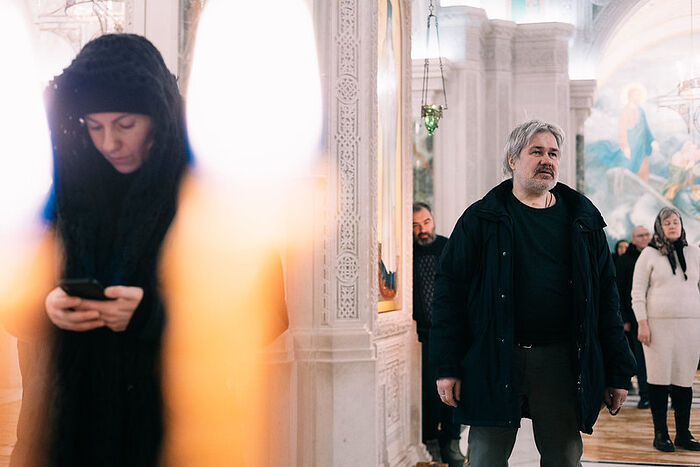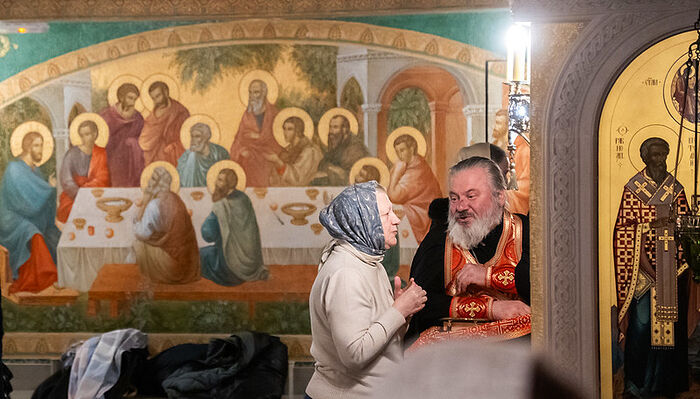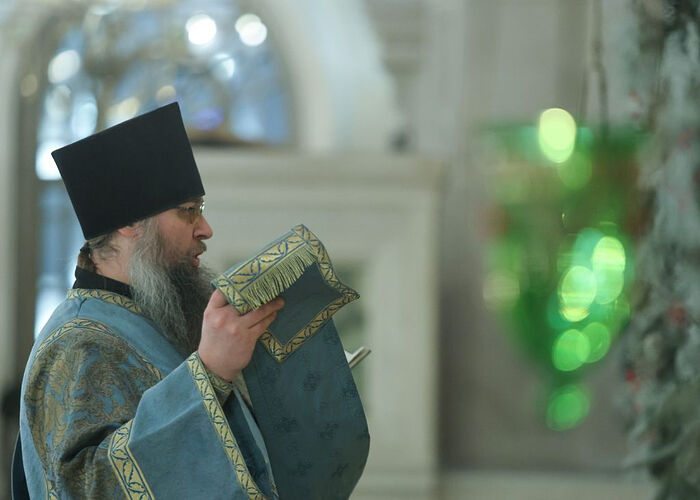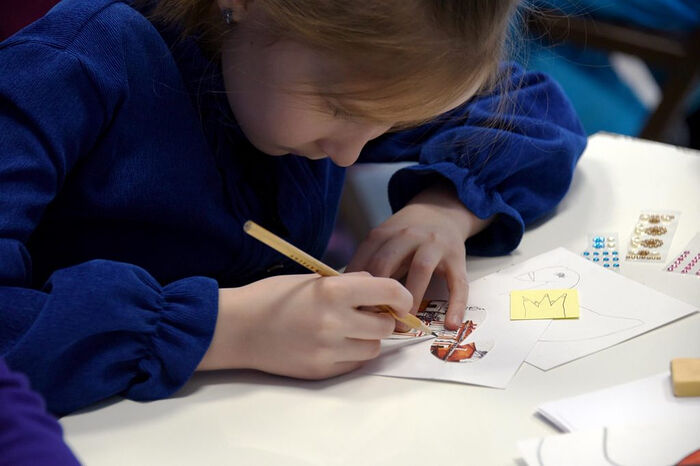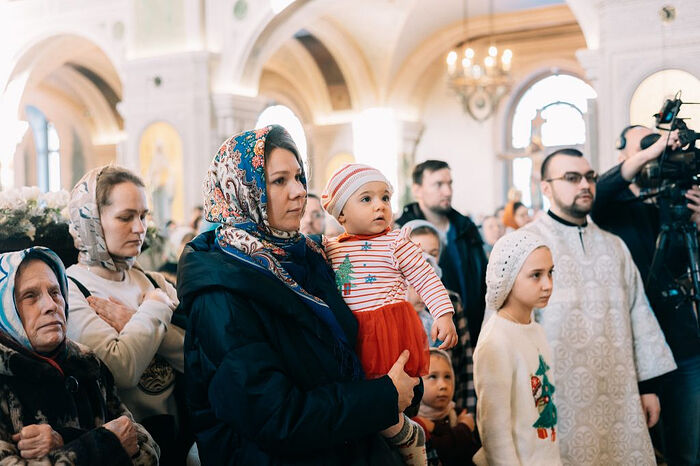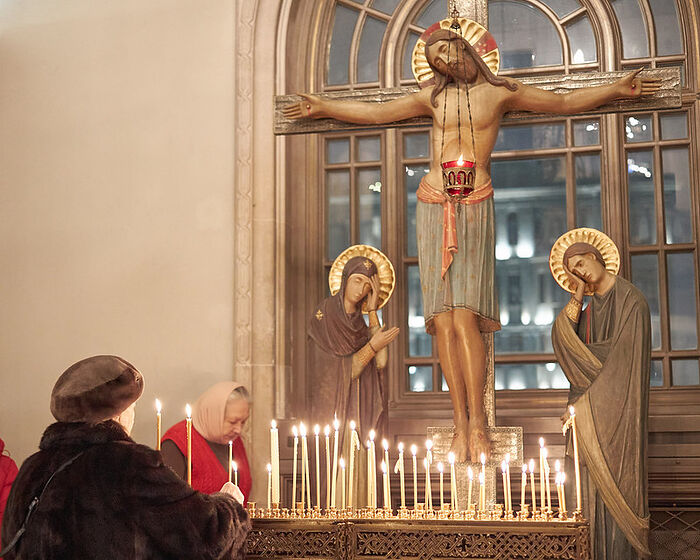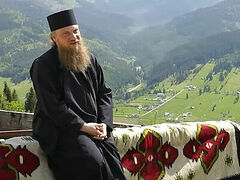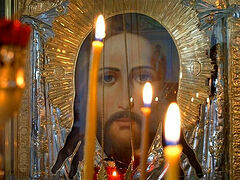On acquiring hesychasm, or silence
Of course, it’s very difficult for people to concentrate. We’ve already spoken about an important aspect of prayer today. Prayer has many dimensions, and one of them is the problem you’re talking about: How to gather your thoughts to truly pray.
Indeed, it’s very difficult to bring the mind into concentration. The Holy Fathers of the Church often talk about this, considering it a consequence of the Fall, that is, a sickness of the mind.
The first thing to do when we begin living according to the teachings of Christ and we have a lot of thoughts is not to worry about it. That is, when some thought comes to me during prayer and I’m tormented by the question of why this thought came to me or why this is happening, then the problem increases. St. Porphyrios says: “When you pray, don’t do so with anxiety and panic, because if you pray about something in this state, it increases your anxiety and worry.” The same thing happens with thoughts. You have to understand that this is something unnatural—that’s how our mind works. An unhealed mind can’t remain calm; it concentrates on one thing and then moves on to something else; it creates scenes, terrible scenes. For example, your child is held up at school, he comes home late, and your mind starts “writing” scenes—he’s going to come home all beat up; he got in a fight with a classmate and they took him to the police, and so on. Or we have other thoughts, about slander, jealousy, envy… We should be calm about it and say to ourselves in such situations:
“It’s okay. Everything’s fine. Calm down. Relax. Keep praying.”
One elder told us that when you’re in church and your mind starts wandering somewhere, then you start thinking about extraneous things. You start thinking about what you’re going to have for lunch, what you’re going to do today. Or you start thinking about your husband, children, and everything else that torments and worries you. Don’t worry about anything, gather your thoughts, and “return” to church again. If your mind gets lost somewhere, bring it back to church, but do it gently, kindly, calmly, not with worry, anxiety, or a feeling of guilt and obsession—because that increases the anxiety, and anxiety increases evil thoughts.
How should we confess our thoughts to a priest? We go to the priest and tell him:
“Father, I get thoughts like this and this and this.”
I don’t analyze thoughts; I don’t need to do that, because it doesn’t always help. Say, I have lustful, angry thoughts, and so on. When you reveal your thoughts, they lose their power. It’s healing. It’s like experiencing some kind of grief, telling your friend about it, and feeling sudden relief. How much greater is the relief on a spiritual level—you share your suffering with the priest and you immediately feel relief.
Another important thing is that we have to try to commune more often. Without Communion of the Holy Mysteries of Christ, our mind, according to the Holy Fathers, becomes either darkened or demonic. We have to receive Holy Communion more often. We have to do all this with God’s grace, and gradually, because it’s not just a human work—we need God’s help and God’s grace. In this way, thoughts will gradually decrease. And you’ll see that those who practice prayer gradually, by the grace of God, begin to more easily enter into a state where they won’t be too distracted, will be gathered in their thoughts; while for others it takes longer, and perhaps they can’t concentrate during prayer at all.
Let’s not make a big mistake: When prayer stops, the mind wanders, we yawn, it weighs us down, and we say:
“What did I just do? I didn’t do anything.”
Or:
“Father, did this prayer do me any good?”
This is the wrong way of thinking. Even the simplest prayer is useful for both beginners and those who are advanced in prayer, because the Lord looks at our disposition. He looks not only at the words, but also at your heart, that you have a good disposition towards prayer. The Lord will help you because of this, and therefore the thoughts gradually decrease and there comes a moment when they are kept to a minimum. And as for those thoughts that remain, you can easily control them. Of course, you also have to have attention. Once the number of thoughts is reduced, you shouldn’t go see your neighbor to gossip with her over a cup of coffee, because then the thoughts will be activated again. If you condemn, if you gossip, if you interfere in someone else’s life, this stirs up the thoughts. One stimulates the other.
I think that a man who believes and labors ascetically will go through all the stages of prayer. And through prayer that isn’t a prayer, but a request; that is, he’ll ask God for something; he’ll feel anxiety, pain, confusion, and he’ll express to God his need for help and his desire to deliver himself from troubles. That’s why the Church doesn’t reject people’s petitions—the litanies have many petitions, for well-being, for those sailing and traveling, for a kind answer, and so on. There’s nothing bad about this.
But petitions should be an encounter, a relationship with God; they should be the result of a living relationship. It’s one thing (and you can see it in life) to say:
“I love you. I care about you. I want to see you and talk with you.”
In a word, through this relationship we want something from the other person. You want to keep me company, go with me to the doctor because I’m scared, go on a trip with me to cheer me up a little, or help me financially. You have some requests, but they’re part of our relationship. ‘
It’s quite another thing to not be interested in the other person at all, to not talk or communicate with them, but then after barely noticing them, to ask:
“Can you lend me fifty bucks?”
This says you want to receive something from the other person but without having a relationship with them. This very often happens in the religious world, though not so much in the Church, because a Church person is something else. A Church person is someone who feels like a part of the Body of Christ, who participates in Holy Communion, in the Sacraments of the Church, and wants Christ to become the center of his life. A simply “religious man” fulfills some religious duties, goes to church on Pascha, Christmas, and when he communes on these great feasts, he says:
“God grant us good health next year! If we’re healthy, we’ll commune again next year.”
Since Christ isn’t the center of such a man’s life, he’s interested in receiving the Holy Mysteries to fulfill one of his religious obligations. Obviously a man in the Church must grow. Our goal is not to remain in an unchanging state where we only entreat God, but to enter into praise and thanksgiving, which are the highest states of prayer. As Elder Paisios says, there’s nobility in praising God, not constantly asking Him for something, but thanking Him for good and bad things, for the wonderful and difficult moments of our lives, for what we understand and what we don’t understand.
On expressing feelings
A man has an emotional world; he has feelings, he has emotions like sorrow, joy, anger, and love. They should be expressed, and we have to find ways to express them, whether it’s in words or art. What is art? The need to express your inner world. This is the highest form of healing and expression, because you take one amorphous and chaotic feeling and shape it, turn it into a poem, prose, sculpture.
Elder Sophrony says that the highest art form is prayer, because, according to him, you take this world of contradictory, chaotic, dark feelings, and turn them into a word or prayer. We have to bring them out and manifest them, because if we don’t express them, then they take on flesh. As Fr. Ananias Koustenis says, if these “great desires” of the human soul aren’t fulfilled, they take on a bodily form and become a headache. Usually soft tissues are affected, so you get migraines, you can’t swallow, you get bloated, and you can’t calm down.
You have to express yourself, express your feelings. Here there’s another problem, and we could have a whole conversation about how to express our feelings so they don’t hurt someone else. Some people go to extremes and say, “I’m going to say what I’m feeling!” and thereby hurt other people. Here you need art— that is, the ability to say what you’re feeling without offending or disappointing the other person with your words. You need spiritual discernment.
On prayer for children
It’s easier for a child to pray because he’s sincere, he doesn’t wear masks; although today we easily corrupt our children, because from an early age we teach them to be deceptive. You can tell a child, “Deceive your grandmother! Deceive your mother! Lie to your teacher!”
But he won’t stop being sincere. Children don’t stop being sincere, and that’s why sometimes we become a laughing stock—we go somewhere with them and they say everything and put us in an awkward position. It’s easier for children to have a genuine and sincere relationship with God. Why?
To be imbued with prayer, children need a living example, because they can’t analyze—they don’t have an analytical mind, but a synthesizing mind. They take note of people’s states and create associations. When mama prays, she’s joyful, and therefore, prayer is something good. Do you understand? Mama goes to church and comes back calm. This priest is kind, but that person is evil—children connect situations with each other. That’s why it was very good in the past when our mothers told us: “This is what you’re going to wear when you go to the Divine Liturgy. You’ll wear dress shoes when you go to church.”
Or my yiayia would say: “It’s Saturday today, and we don’t work in the village.”
Now, everything’s different. Then we burned incense, lit the lampada, took a bath, and in the morning, we went to church. These things, inasmuch as they are particular symbols, begin to act on a child, creating associations for him: The Sunday meal is joy; church is joy, Resurrection, and light. And the opposite is also true.
Therefore, if we want our children to be attached to prayer, we have to pray and show them an example of prayer. St. Nektarios of Aegina thanked his grandmother all the days of his life. Elder Sophrony (Sakharov) was indebted to his teacher for teaching him how to pray. She showed him the sanctity of prayer.
There’s a very good cleric on Crete, Fr. Stavros, who has a piece of the Precious Cross. Since his mother was poor, he was raised by his aunt. He told a story about his mother, that when someone got sick, she would say:
“The Cross will help us! The Cross of Christ will heal us!”
Thus, the child understood that every blessing and goodness, even in the hour of suffering and trial, comes from the Cross.
Once, as a young child, Fr. Stavros was playing on the roof when he slipped, fell off the roof, and died. They rang the bell and carried him into the house. In despair, mourning for her child, his mother remembered the piece of the Holy Cross. She took the particle, placed it on her child, and felt that her son was still warm. She began to shout:
“He’s alive! My son is alive!”
Of course, everyone thought she was going crazy, but she insisted, and the child really did come back to life. This was Fr. Stavros, who was thus baptized with this name.1
All of Crete knows about this, because it was a very famous incident at the time. Fr. Stavros is an adult now. He guards the piece of the Holy Cross; he greatly reveres it; he doesn’t sell it or advertise it. He’s a man of few words; he’s a humble and serious man. The papers only wrote about it once. He took the piece of the Precious Cross, took it to Elder Ephraim of Katounakia, and told him:
“Geronda, this piece of the Precious Cross has one peculiarity.”
“What is it?”
“When you cross someone with it, it sticks to the painful spot and it’s difficult to peel it off.”
Why does this happen? After many days of prayer, Elder Ephraim discovered that this piece of the Precious Cross has a special blessing, because it contains dried drops of Christ’s Blood. That’s why it has received this special blessing.
I told you about this to show how important it is that children have examples of prayer, of the Church atmosphere, and all the rest. This is how we help them find a sincere and living relationship with God. It’s enough for them to see joy in our eyes and on our face, that they see their parents joyful. It’s enough for children to see that their parents love Christ, are in the Church, and aren’t full of grumbling, aren’t sullen, angry, withdrawn, always murmuring and saying that everything’s a sin, everything’s evil, and that sinners, the devil, 666, satanists are to blame for everything. It’s important for children to see that their parents rejoice in Christ, the light of Christ, the saints, the Divine Liturgy, prayer, that they have faith, the desire for life, and see the good sides of all people. Such is a man of God, and according to the words of Elder Aimilianos of Simonopetra, “if a man doesn’t have joy, he doesn’t have God.”

